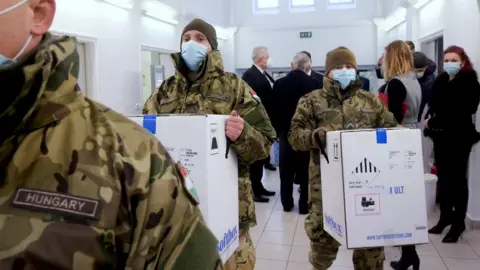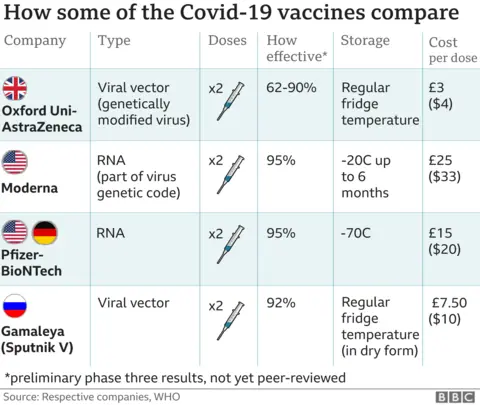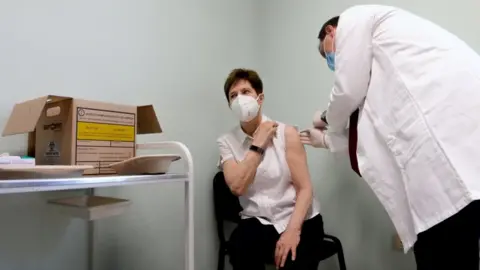Coronavirus: Hungary first in EU to approve Russian vaccine
 Reuters
ReutersHungary has become the first country in the European Union to give preliminary approval to the Russian coronavirus vaccine, Sputnik V.
On Thursday, Prime Minister Viktor Orban's chief of staff confirmed both the Russian jab and the Oxford-AstraZeneca vaccine had been given the green light by the health authorities.
Foreign Minister Peter Szijjarto is travelling to Moscow for further talks, where he is expected to discuss a shipment and distribution deal.
Early results from trials of the Sputnik vaccine have shown promising results.
Hungarian health officials are also in Beijing for talks with the Chinese authorities over the approval and immediate delivery of one million doses of the Sinopharm vaccine, which is already being used in neighbouring Serbia.
Sinopharm, a Chinese state-owned company, announced last month that phase three trials of its jab showed that it was 79% effective - lower than that of Pfizer and Moderna.
But Hungary's prime minister has said the only way the country can satisfy the demand for vaccination, given the "frustratingly" slow delivery of the Pfizer-BioNTech vaccine, is by buying from Russia and China.

At least 140,000 Hungarians have already been vaccinated. But government efforts to popularise the Russian and Chinese vaccines have already run into opposition.
The scepticism and suspicion among Hungarians is, in the public imagination at least, related to the Communist domination of the country from 1948 to 1989.
The move has also drawn criticism from the European Union, which is wary of yet another example of Mr Orban's government going its own way and undermining EU solidarity.
 Reuters
ReutersIn the capital Budapest, outside the Allee shopping mall, views are mixed about vaccination in general. There are particularly strong feelings here about the prospect of non-EU developed vaccines being rolled out.
Orsolya Egri, a hospice worker, said she believed there was a "huge difference" between a vaccine gaining Hungarian approval and EU-wide approval.
"If [it is only approved] by the Hungarian authorities, I would not dare," she said. "I don't trust the Hungarian government [or the] health system either."
Ms Egri has already received the Pfizer vaccine, because of the nature of her work, but she is especially concerned about her elderly parents who might have no choice about which vaccine they receive.
"I've had the Pfizer [vaccine] already, and I would recommend it to anyone," Alexandra Tarhazy, a dentist's assistant, said. "I trust it more because Hungarians were involved in developing it."
Katalin Kariko, a biochemist who left Hungary for the US in 1985, played a key role in developing the Pfizer-BioNTech vaccine.
"I'm fit, I avoid all jabs. I just hope they don't force it on us," said Jozsef, who was making motorbike food deliveries to supplement lost income from his day job. "I don't trust any of them."
In fact, Hungarians are among the most vaccine-sceptical people in Europe. Only 49 percent are willing to be vaccinated, according to the latest Eurobarometer poll.
Some blame this reluctance on the government's enthusiasm for Moscow and Beijing, as well as its hostility to all things European.
"The foreign policy line is that we have to be on good terms with the big eastern powers," said Anita Elo, health correspondent for the independent conservative portal, Valasz. "But the degree of vehemence with which the government has communicated that is scaring people off."


Some polls suggest only seven percent of Hungarians would accept the Russian vaccine, while acceptance of the Chinese version has been measured as low as one percent by some surveys.
The government, however, fiercely refutes criticism of the jabs.
"No vaccine can come to the Hungarian market that is not up to the standards that would make it safe [and] reliable," government spokesman Zoltan Kovacs told me. "Don't look for any kind of conspiracy here."
The criticism of Hungary for striking vaccine deals with eastern allies is proof of "double standards" in the West, he insisted. Mr Kovacs noted that German Chancellor Angela Merkel and Russian President Vladimir Putin had held talks on the same issue.
Russia is funding and building a major expansion of Hungary's nuclear power station at Paks. The Chinese Fudan University is also due to open a campus in Budapest in 2024, and plans are advancing for a high-speed Chinese railway that would link Budapest to Thessaloniki and bring Chinese goods to Europe.
Meanwhile, a senior doctor told the BBC that 6,000 doses of the Sputnik V vaccine will be administered to 3,000 paid Hungarian volunteers in phase three of a clinical trial in the coming weeks.
"The vaccine is good," he said. "But please don't let the government know I've been talking to you."
